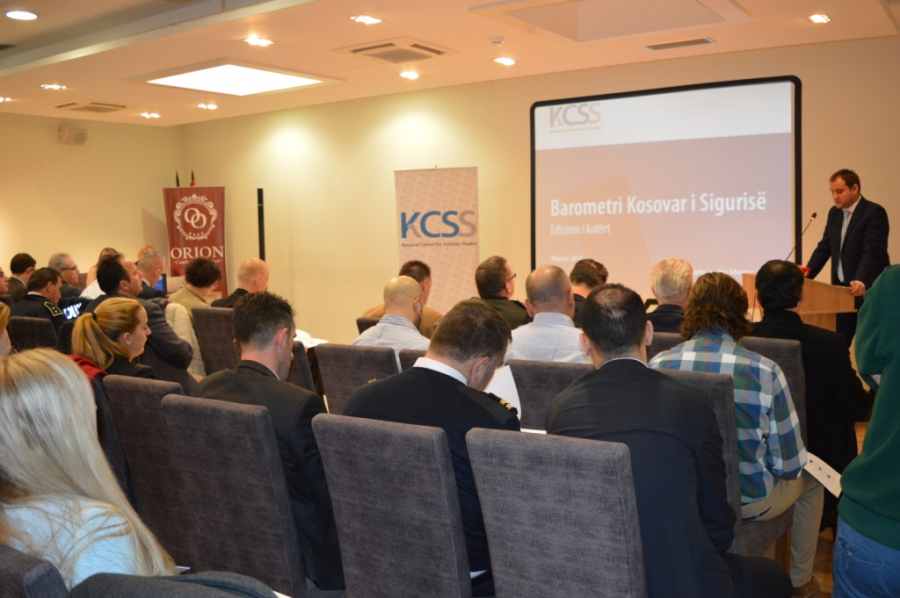16/12/2014

The Kosovar Center for Security Studies (KCSS) today launched the results of the fourth edition of the Kosovar Security Barometer (KSB). Through this program the KCSS measured the public opinion regarding the public’s trust towards security and justice institutions in Kosovo, the citizen's opinions toward the challenges and threats of national security including internal and external threats. The survey has been conducted during October with 1011 citizens from all over the territory of the Republic of Kosovo.
The results of the Kosovar Security Barometer show a low trust in executive institutions, justice and the rule of law alike : a high percentage of Kosovo citizens don’t believe in the governments work, 63% of them have no trust in the governments work. Following Kosovo’s government, Kosovo citizens evaluated a low trust in Kosovo’s Prosecution, where 52.6% of citizens have no trust in the State Prosecution’s work, and Kosovo’s juridical system with 50.9% of citizens who don’t trust their work and finally EULEX to whom 41.9% of citizens don’t have trust in. This is a good indicator that Kosovo’s citizens are not pleased with the state institutions work and the presence of the internationals in their country. The low scale of trust toward these institutions according to the citizens of Kosovo comes as a result of the will to fight corruption in public institutions, organized crime, and a low and slow efficiency in resolving many legal cases. Kosovo’s citizens have a medium trust in Kosovo’s Police, where only 43.5% believe in their work, and another 33.6% of them have an average belief in the efficacy of Kosovo’s Police. As the main obstacles to citizens cooperation with the Police was their limited knowledge on how to contact them, and a fear of revealing their identity in the case of cooperation, or the leaking of information to the police. The citizens, saw as the most trustful institution in performence evaluated the Kosovo Security Force (65.8%), Fire brigade(66.8%) and KFOR(63.8%). According to them, these institutions have the greatest trust from the citizens in offering protection and security for Kosovo’s citizens.
The Kosovar Security Barometer has measured the public opinion on the scale of corruption in political institutions, security and justice. As their 'corruption champions' they evaluated these institutions: Kosovo’s government, 73%, Kosovo’s prosecution 87.4%, Kosovo’s juridical system 80.8% and Municipalities 55%. As for Kosovo’s Police, 34% of citizens thought that corruption exists inside Police, and 29.25% thought that there was a medium presence of corruption in Police. Kosovo’s Security Force (KSF) has been evaluated as the least corrupted institution in Kosovo, as only 7.5 of citizens think that the KSF is corrupted. The citizens expressed their worries about the threats and dangers for the states national security, including internal and external threats: the main internal threats according to them are: Unemployment 77.7%, followed by corruption 72.8%, inner political stability and visa liberalization 45.0%.
As the biggest external threat to national security the citizens evaluated these threats: Kosovo’s citizen participation in conflicts in Syria and Iraq 84.3%, Serbia’s access towards Kosovo 72.1%, international terrorism 60.5%, political interventions from other countries 48.4% and the spread of lethal diseases 72.9%. The citizens have also been asked about the sources of inner threats and dangers for Kosovo, and as sources they considered: Organized Crime 85.1%, North Kosovo’s problems 73.2%, religious radicalization in Kosovo 66.5% and natural disasters 35.4%.
As the KCSS has recommended for a long time now, Kosovo’s state institutions should upgrade their performance in order to foster the trust of the citizens towards them. The high scale of corruption in state institutions is one the main factors that is preventing the cooperation and the trust of citizens towards state institutions in Kosovo.
This project was supported by National Endowment for Democracy (NED).